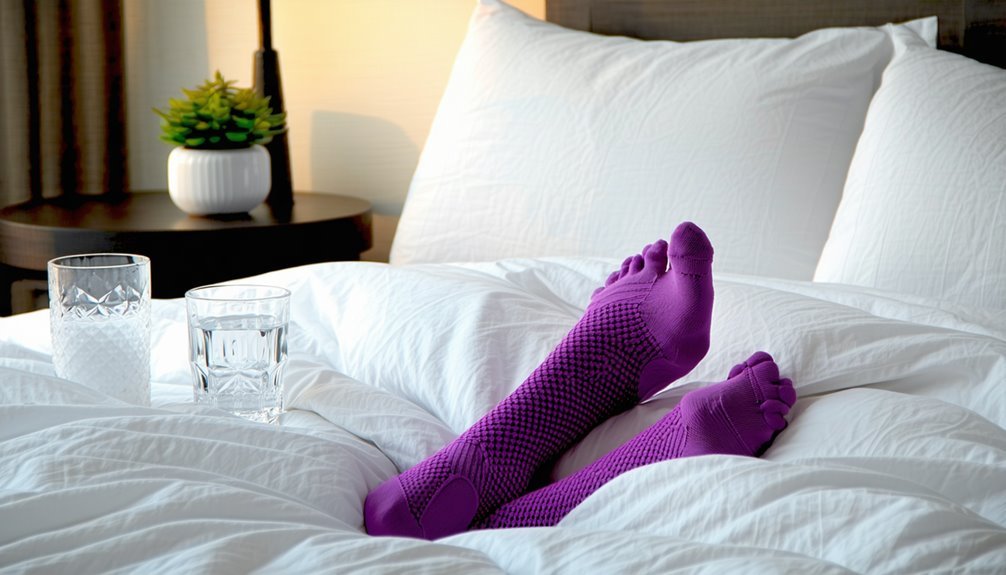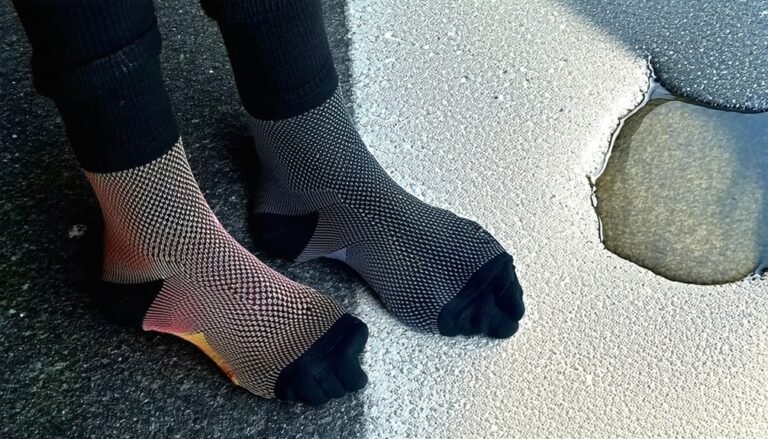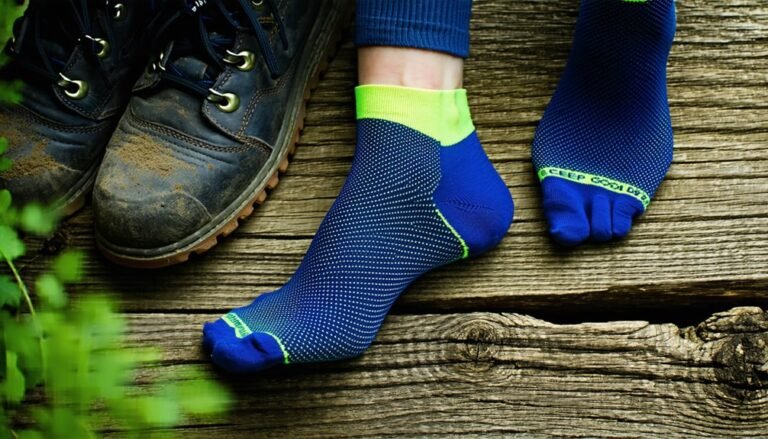Can You Wear Compression Socks to Bed
You can wear compression socks to bed, but there are some important factors to take into account. They can improve circulation and reduce swelling, especially if you have varicose veins or diabetes. However, if the socks are too tight, they might restrict blood flow and cause skin irritation or discomfort that disrupts your sleep. It's a good idea to consult with a healthcare provider for personalized advice and to explore other methods for overnight relief that could be beneficial for you.
Understanding Compression Socks and Their Benefits

Compression socks are designed to apply gentle pressure to your legs and feet, helping to improve blood circulation and reduce swelling. By promoting better circulation, these socks can assist in preventing blood clots and alleviate discomfort from conditions like varicose veins. The graduated compression they offer is greatest at the ankle and gradually decreases up the leg, enhancing venous return and ensuring that blood flows more efficiently back to the heart. If you're on your feet for long periods or have a sedentary lifestyle, wearing these socks can be particularly beneficial. They can also be useful during pregnancy or after surgery to aid in circulation improvement and swelling reduction, ensuring your legs feel more comfortable and energized throughout the day.
Pros of Wearing Compression Socks at Night
While many people associate compression socks with daytime use, wearing them at night can offer several benefits. One major advantage is circulation improvement. By providing graduated compression, these socks help maintain blood flow, which can be particularly beneficial for those with conditions like varicose veins or diabetes. Additionally, wearing compression socks at night can lead to swelling reduction. If you experience swollen legs or feet after a long day, these socks can help prevent fluid buildup during sleep. This can lead to more comfortable mornings and less discomfort throughout the day. Ultimately, incorporating compression socks into your nighttime routine can support your overall vascular health, making it a practical choice for many individuals seeking relief.
Cons of Wearing Compression Socks While Sleeping
Although many people find compression socks beneficial during the day, wearing them while sleeping can come with drawbacks. It's crucial to evaluate potential discomfort concerns and circulation issues that might arise when you wear them at night. Here are some things to think about:
- Restricted blood flow if the socks are too tight
- Increased risk of skin irritation or rashes
- Discomfort that could disrupt your sleep quality
- Potential for muscle cramping due to prolonged compression
If you're contemplating wearing compression socks to bed, it's vital to weigh these cons against the benefits. Always consult with a healthcare professional to ascertain nighttime use aligns with your individual health needs and won't compromise your comfort or circulation.
Expert Recommendations on Nighttime Use

When considering wearing compression socks at night, it's vital to heed expert recommendations to guarantee safety and comfort. Many healthcare professionals suggest using compression therapy primarily during the day when you're most active. If you choose to wear them at night, opt for lighter compression levels, as this can help maintain circulation without compromising your sleep quality. It's also essential to listen to your body; if you experience discomfort or swelling, remove the socks. Consulting with a healthcare provider is advisable to tailor the use of compression socks to your specific needs. Ultimately, ensuring that both your health and sleep are prioritized will lead to a better overall experience with compression therapy.
Alternatives to Compression Socks for Overnight Relief
If compression socks don't feel right for you at night, there are several alternatives that can provide overnight relief for your legs and feet. Here are some options to contemplate:
- Elevating legs: Prop your legs up on pillows to reduce swelling and improve circulation.
- Gentle stretching: Perform light stretches before bed to enhance blood flow and relieve tension.
- Cold compresses: Apply cold packs to your legs to soothe discomfort and reduce inflammation.
- Herbal remedies: Contemplate natural supplements like horse chestnut or ginger, which may help improve circulation.
These alternatives can be effective for alleviating discomfort as you sleep. Always consult with a healthcare professional before trying new methods, especially if you have underlying health conditions.
Frequently Asked Questions
Can Wearing Compression Socks Improve Sleep Quality?
Could wearing compression socks actually enhance your sleep quality? Many people find sleep benefits from improved circulation, which can reduce discomfort during the night. Just be sure to consult a healthcare professional for personalized guidance.
Are There Specific Brands Recommended for Overnight Use?
When considering overnight use, look for compression sock brands like Sigvaris or Medi, which offer specific overnight sock types designed for comfort and safety. Always consult a healthcare professional to guarantee the right fit for your needs.
How Do I Choose the Right Size for Nighttime Wear?
Choosing the right size for nighttime wear's like finding a cozy blanket—comfort is key. Measure your calf's circumference and length, and consider sock materials for breathability. A proper fit guarantees safety and effectiveness while you sleep.
Can Compression Socks Cause Skin Irritation While Sleeping?
Yes, compression socks can cause skin irritation while sleeping, especially if you have skin sensitivity. Choosing the right fabric is essential; opt for breathable, moisture-wicking materials to minimize discomfort and avoid allergic reactions.
Should I Consult a Doctor Before Wearing Them to Bed?
Before wearing compression socks to bed, it's wise to consult your doctor for recommendations. They can help guarantee you'll experience sleep benefits without potential complications, especially if you have underlying health conditions or concerns.






